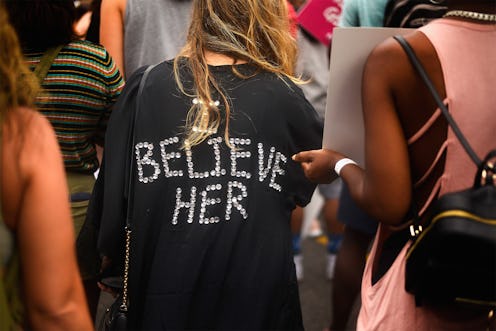News
Why Women Don't Have To Say "Me Too"

If you scrolled through any of your social media feeds on Tuesday, you'll likely see woman after woman declaring, "me too." The campaign has largely done as intended, highlighting the magnitude of sexual harassment and assault, but it's important to remember the stories you see only include the ones women are ready to tell. And no one should feel guilty about not wanting to join in and say "me too."
Leigh Gilmore, a gender studies professor at Wellesley College and author of Tainted Witness: Why We Doubt What Women Say About Their Lives, points out that anyone can be supportive of the campaign by simply listening and being supportive of those who did choose to join in.
"It's important to remember that anyone can participate by being a witness to this testimony," Gilmore tells Bustle. "To hearing the stories as they come out. To keeping the space open for us to learn about the toxic masculinity and rape culture that harms all of us."
Whether someone contributed an account of a particular abuser, simply posted "me too," or hasn't joined in at all is entirely up to them. Women are only sharing what they feel comfortable with the world knowing right now, and some people have used the hashtag to tell those not speaking out that their choice is valid.
The social media campaign was ignited in the aftermath of allegations that film tycoon Harvey Weinstein sexually harassed and assaulted women in the industry for years. The campaign was actually started by activist Tarana Burke about a decade ago, and sadly women are still trying to prove that the issue needs attention. Weinstein's spokesperson has said, "Any allegations of nonconsensual sex are unequivocally denied by Mr. Weinstein."
The sheer volume of "me too" posts helps prove the point that women everywhere experience sexual harassment and at least one in five women in the United States are sexually assaulted at some point in their lives. (Of course, these issues don't only impact women, but 91 percent of sexual assault survivors are female, according to the National Sexual Violence Research Center.) However, the campaign can't possibly account for every story of inappropriate behavior — and for a reason everyone needs to recognize.
There are myriad reasons someone might not want to publicly acknowledge that they've experienced harassment or assault, and no one should be pressured to vocalize their trauma. The "me too" hashtag has helped illuminate how pervasive these issues are, but it also requires survivors to do the work. Not everyone is ready or willing to take on that emotional labor, and they shouldn't be expected to.
As Helen Rosner pointed out on Twitter, some also took issue with the language choice of "me too," as it focuses on survivors, not harassers and abusers. "I resent having to affirmatively embrace my victimhood when he's never been forced to confront his villainy," Rosner wrote.
Whatever the reason, you shouldn't judge yourself or others for sitting this one out. You don't have anything to prove. The "me too" hashtag is about solidarity, and solidarity means standing by women whether they participate or not. It means believing women when they say they've experienced harassment or assault but aren't ready to share the details. And it means recognizing that whether stories are made public or not, they happened.